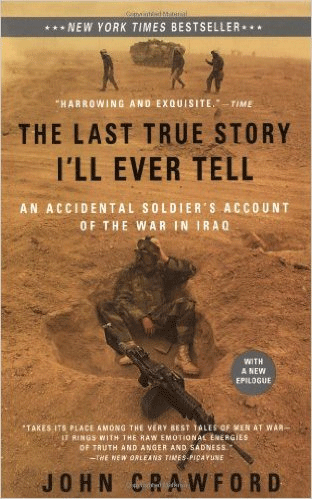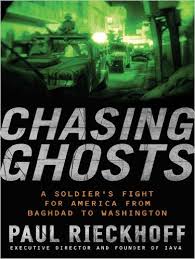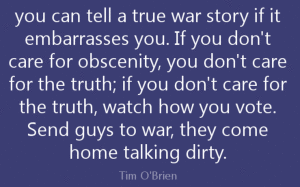Students Confront the Third World: Army National Guard in Iraq War
 Going to college is a surreal time for most young people, an extension of adolescence in advance of adulthood. Away from home for the first time, students enter an artificial world where the only authoritative restraints are faculty members, who are also motivated to be popular and cool so as to gain career-important high scores on student evals.
Going to college is a surreal time for most young people, an extension of adolescence in advance of adulthood. Away from home for the first time, students enter an artificial world where the only authoritative restraints are faculty members, who are also motivated to be popular and cool so as to gain career-important high scores on student evals.
Social experiments are the order of the day. Dorm life means a quest for intoxication, profanity, loud music, and sex—the “final exam” being Spring Break when it all comes together. No wonder that students during the 1960s didn’t want their partying interrupted by the Vietnam War. To hell with the draft.
It didn’t take long for the government to learn that actually paying students to attend college was better, especially after costs skyrocketed. The Army National Guard was perfect financially, the best of both worlds as a Weekend Warrior (just once a month, then only two weeks once a year).
At least John Crawford thought so until his time at Florida State University and with the Florida National Guard was cut short one-semester-from-graduation to be whisked away to the Third World to battle other young people he knew little about. He had also just gotten married. His book is The Last True Story I’ll Ever Tell: An Accidental Soldier’s Account of the War in Iraq.
“I was planning to enroll in a master’s program at FSU, instead I took a vacation to Iraq,” but he found himself immersed in an impoverished world of chaos, filth, and moral degradation as he patrolled the ever-perilous streets of Baghdad and along the Tigris River. Abraham’s ancient Land of Ur was now a hellhole of death, ruination, and suffering. The now-arid Fertile Crescent was anything but.
Being with other young National Guard soldiers (and nearby US Marine units) was still a lot like being in college–though now a perverse freedom with the same urge to become intoxicated, swear loudly, and question authority. “The Americans act like kids, basically. And Iraqi people thought of us as big children,” he says.
Crawford found that he and his fellow soldiers ironically felt like they’d been drafted into the Peace Corps, but without any skills needed to repair urban breakdowns involving the power grid or sewerage system. “Baghdad stinks. There’s constant water in the street. There’s no one to pick up the trash, so it all piles up outside,” he reports. “It’d been two years after the start of the war when I was there, and the greatest nation on Earth could even keep the lights on.”
 Another Florida Army National Guard soldier, Paul Rieckhoff, also wrote a book, Chasing Ghosts, about his experiences as a combat platoon leader in the Iraq War. Unlike Crawford, he had just barely graduated from college, but soon found himself in a depraved world—with few comfort reliefs:
Another Florida Army National Guard soldier, Paul Rieckhoff, also wrote a book, Chasing Ghosts, about his experiences as a combat platoon leader in the Iraq War. Unlike Crawford, he had just barely graduated from college, but soon found himself in a depraved world—with few comfort reliefs:
“When you’re walking down the street for a year, you never know if a little kid is going to blow up on you. You never know if somebody is going to throw a grenade at you, if a mortar round that drops from your guys lands in the right place or not, I mean there’s this tremendous gravity to everything you do. And people kind of believe it’s like Vietnam, and everybody goes back to Saigon, and there are hookers, and everyone gets drunk and shoots heroin. It’s not like that in Iraq—it’s a pressure cooker for a year and you don’t get any breaks. There’s no downtown bars for you to hangout at, and you can’t go chill with the boys at a dance club. During my time there were no freakin’ girls. And then there’s the demands on the families. I don’t think people realize what these guys are giving up.”
While nightly television during the Vietnam War reminded the public how student demonstrators were being truncheoned by police thugs, both Crawford and Rieckhoff lament how the people back home seemed in a surreal political world of their own making.
As Rieckhoff observed on returning after a long deployment, “America was a country at war. But it sure  didn’t look like it. Everywhere I went I saw Americans living their lives entirely uninterrupted. No threat of the draft, no increase in taxes, no sacrifice whatsoever. All the benefits with none of the risks. Patriotism Lite. It was hard not to hate them all. Didn’t these people understand there was a war going on? Weren’t they concerned about the future of their country? Didn’t they care? No. And no one was making them care. Certainly not the president. The American public had no idea that thousands of soldiers were on their second tours in Iraq, without body armor, in thin-skinned Humvees.”
didn’t look like it. Everywhere I went I saw Americans living their lives entirely uninterrupted. No threat of the draft, no increase in taxes, no sacrifice whatsoever. All the benefits with none of the risks. Patriotism Lite. It was hard not to hate them all. Didn’t these people understand there was a war going on? Weren’t they concerned about the future of their country? Didn’t they care? No. And no one was making them care. Certainly not the president. The American public had no idea that thousands of soldiers were on their second tours in Iraq, without body armor, in thin-skinned Humvees.”
You are invited to hear Major Dana Limbo of the South Dakota Army National Guard talk about his combat experiences during the Iraq War on Saturday, February 13, at Ellsworth Air Force Base’s South Dakota Air and Space Museum, 9:00 to 11:30 am (first half hour is social period), a free event sponsored by the Black Hills Veterans Writing Group. Then a 1st Lieutenant, Limbo experienced daily mortar attacks 45 miles above Baghdad along the Tigris River.
 Going to college is a surreal time for most young people, an extension of adolescence in advance of adulthood. Away from home for the first time, students enter an artificial world where the only authoritative restraints are faculty members, who are also motivated to be popular and cool so as to gain career-important high scores on student evals.
Going to college is a surreal time for most young people, an extension of adolescence in advance of adulthood. Away from home for the first time, students enter an artificial world where the only authoritative restraints are faculty members, who are also motivated to be popular and cool so as to gain career-important high scores on student evals. Another Florida Army National Guard soldier, Paul Rieckhoff, also wrote a book, Chasing Ghosts, about his experiences as a combat platoon leader in the Iraq War. Unlike Crawford, he had just barely graduated from college, but soon found himself in a depraved world—with few comfort reliefs:
Another Florida Army National Guard soldier, Paul Rieckhoff, also wrote a book, Chasing Ghosts, about his experiences as a combat platoon leader in the Iraq War. Unlike Crawford, he had just barely graduated from college, but soon found himself in a depraved world—with few comfort reliefs:  didn’t look like it. Everywhere I went I saw Americans living their lives entirely uninterrupted. No threat of the draft, no increase in taxes, no sacrifice whatsoever. All the benefits with none of the risks. Patriotism Lite. It was hard not to hate them all. Didn’t these people understand there was a war going on? Weren’t they concerned about the future of their country? Didn’t they care? No. And no one was making them care. Certainly not the president. The American public had no idea that thousands of soldiers were on their second tours in Iraq, without body armor, in thin-skinned Humvees.”
didn’t look like it. Everywhere I went I saw Americans living their lives entirely uninterrupted. No threat of the draft, no increase in taxes, no sacrifice whatsoever. All the benefits with none of the risks. Patriotism Lite. It was hard not to hate them all. Didn’t these people understand there was a war going on? Weren’t they concerned about the future of their country? Didn’t they care? No. And no one was making them care. Certainly not the president. The American public had no idea that thousands of soldiers were on their second tours in Iraq, without body armor, in thin-skinned Humvees.”